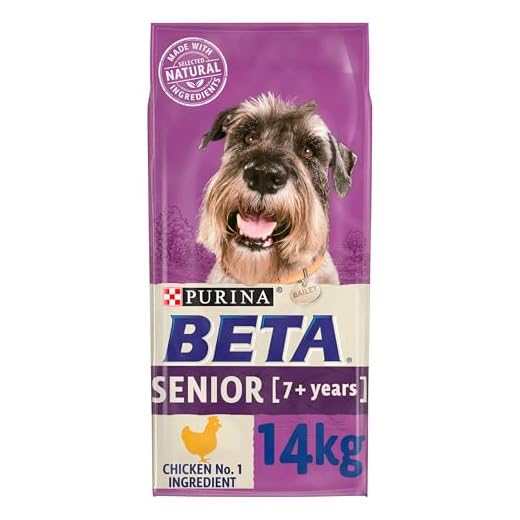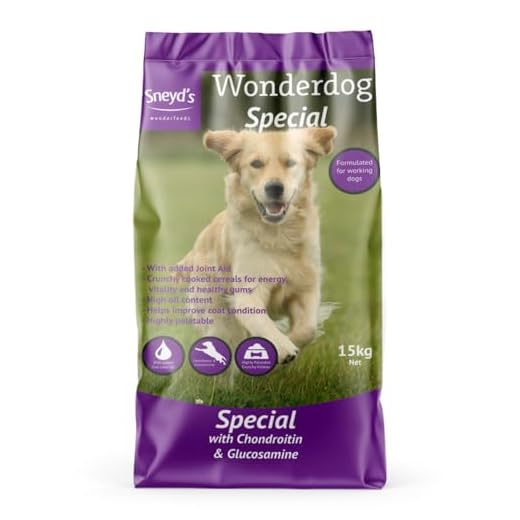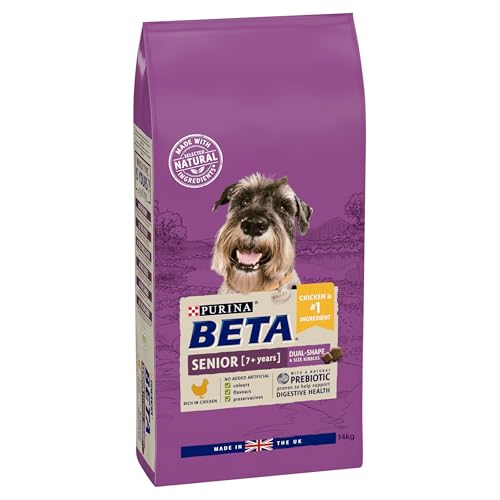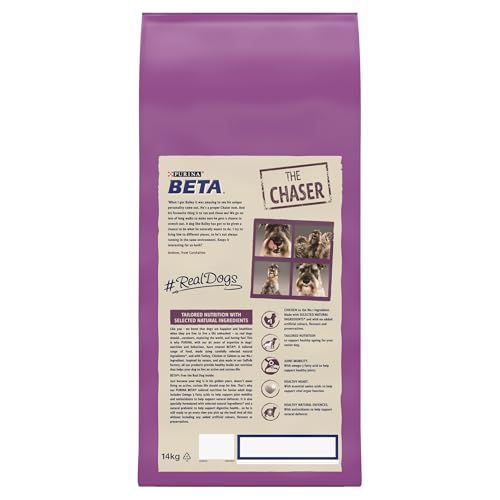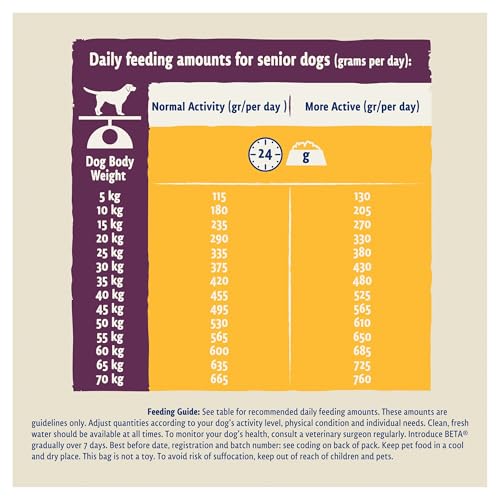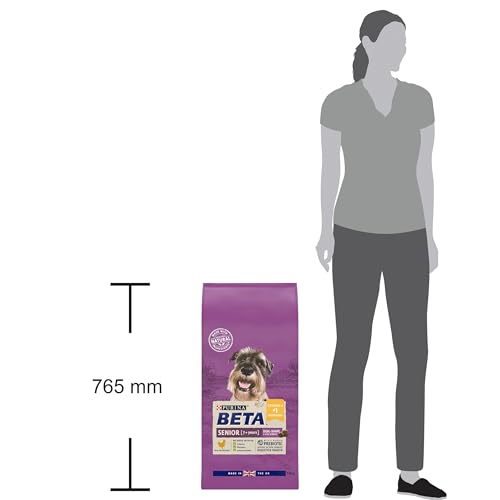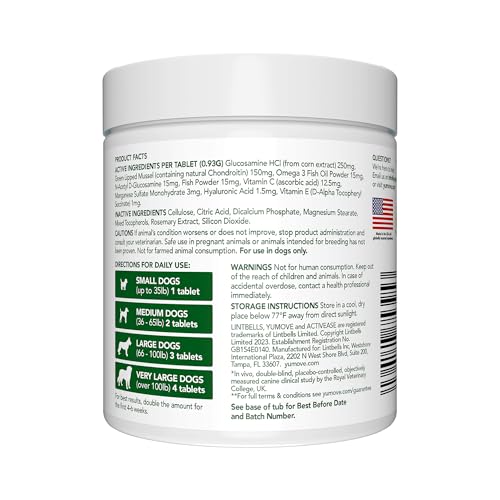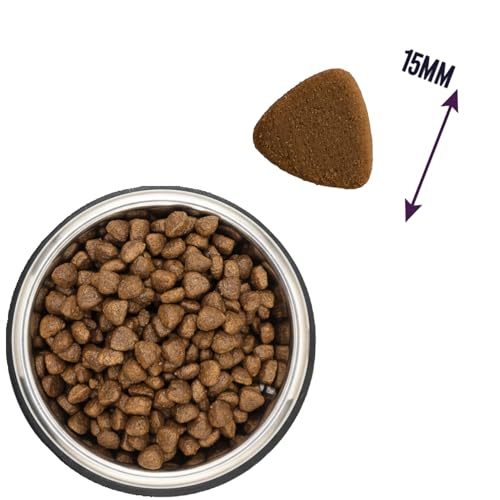




As a devoted pet owner, watching your furry friend age and develop arthritis can be heart-wrenching. I’ve experienced this firsthand with my own senior dog, who started showing signs of joint stiffness and discomfort a few years ago. It became clear to me that her diet played a crucial role in managing her condition and improving her quality of life. Through extensive research and consultations with veterinarians, I’ve discovered some of the best dog food options tailored for seniors with arthritis.
Arthritis in dogs, much like in humans, leads to inflammation and pain in the joints, making movement difficult and sometimes excruciating. Senior dogs are particularly vulnerable, and the right nutrition can make a significant difference in their comfort and mobility. I found that specific ingredients, such as omega-3 fatty acids, glucosamine, and chondroitin, are essential in alleviating symptoms and supporting joint health.
In this article, I’ll share my findings on the best dog food for seniors with arthritis. I’ll discuss the benefits of different ingredients, the importance of balanced nutrition, and review some of the top brands that have proven to be effective for my dog. Whether you’re just starting to notice the signs of arthritis in your senior dog or you’re looking for better options to support their existing condition, this guide aims to provide you with valuable insights to help you make informed decisions for your beloved pet’s well-being.
Understanding Arthritis in Senior Dogs
As our furry companions age, it’s not uncommon for them to develop arthritis, a condition that affects their joints and can significantly impact their quality of life. This painful and often debilitating disease is characterised by inflammation in the joints, leading to stiffness, discomfort, and reduced mobility. Recognising the signs early and taking steps to manage the condition can make a world of difference for your senior dog.
Arthritis in dogs, much like in humans, results from the gradual wear and tear of cartilage that cushions the joints. As the cartilage deteriorates, bones begin to rub against each other, causing pain and inflammation. This process can be exacerbated by factors such as obesity, previous injuries, and genetic predisposition. While arthritis is more common in older dogs, it can also affect younger dogs, especially those of breeds predisposed to joint issues.
Recognising the Symptoms
Identifying arthritis in your dog early on can help in managing the condition more effectively. Common signs include:
- Limping or favouring one leg: Your dog might show a preference for one limb or appear to limp, especially after rest.
- Stiffness: Noticeable after periods of inactivity, such as after sleeping or resting.
- Difficulty in movement: Struggling to stand up, lie down, climb stairs, or jump onto furniture.
- Decreased activity: A reluctance to go for walks or play as they used to.
- Changes in behaviour: Increased irritability, aggression, or withdrawal due to chronic pain.
Being vigilant about these signs and consulting your veterinarian for a proper diagnosis and treatment plan is crucial. X-rays and physical examinations are typically used to confirm arthritis and assess its severity.
Managing Arthritis in Senior Dogs
While arthritis is a progressive condition with no cure, there are several ways to manage the symptoms and improve your dog’s comfort. Treatment plans often include:
- Medications: Anti-inflammatory drugs and pain relievers prescribed by your vet can help reduce pain and swelling.
- Weight management: Keeping your dog at a healthy weight reduces the strain on their joints.
- Exercise: Regular, gentle exercise helps maintain joint mobility and muscle strength.
- Diet: Special diets and supplements, such as glucosamine and chondroitin, can support joint health.
- Comfortable living environment: Providing soft bedding and avoiding slippery floors can make movement easier for your dog.
By understanding arthritis and being proactive in your senior dog’s care, you can help them lead a more comfortable and happy life despite their condition.
Essential Nutrients to Consider in Dog Food for Arthritis
As my dog aged, I noticed that his mobility decreased and he seemed to be in discomfort more often. Realising that arthritis might be a contributing factor, I started researching how to adjust his diet to support his joint health. I found that certain nutrients can make a significant difference in managing arthritis symptoms in dogs.
Choosing the right food for a senior dog with arthritis involves more than just looking for senior dog food labels. It’s crucial to focus on specific ingredients that can help reduce inflammation and support joint function.
Important Nutrients for Joint Health
First and foremost, omega-3 fatty acids are a must. These healthy fats, commonly found in fish oil, can help reduce inflammation and alleviate joint pain. Adding food that contains a good amount of omega-3s can be very beneficial for an arthritic dog.
Another critical component is glucosamine and chondroitin. These compounds are known to support cartilage health and improve joint lubrication, which is vital for dogs suffering from arthritis. Many high-quality dog foods include these supplements, but it’s important to check the labels to ensure they are present.
Antioxidants play a vital role in combating oxidative stress, which can exacerbate arthritis. Vitamins C and E are particularly important, as they help neutralize free radicals and support overall immune health. Including foods rich in these vitamins can help protect your dog’s joints from further damage.
Don’t overlook the importance of protein in your dog’s diet. High-quality protein sources are essential for maintaining muscle mass, which in turn supports joint stability and mobility. Look for foods that list meat or fish as the primary ingredient.
Lastly, the right balance of minerals like calcium and phosphorus is crucial. These minerals are important for bone health, which supports the joints. Ensuring your dog’s food has an appropriate ratio can help maintain their skeletal strength.
- Omega-3 Fatty Acids: Reduces inflammation, found in fish oil.
- Glucosamine and Chondroitin: Supports cartilage health, improves joint lubrication.
- Antioxidants: Vitamins C and E, combats oxidative stress.
- High-Quality Protein: Maintains muscle mass, supports joint stability.
- Minerals: Proper balance of calcium and phosphorus for bone health.
By focusing on these key nutrients, I was able to make more informed decisions about my dog’s diet, which significantly improved his quality of life. If your senior dog is struggling with arthritis, adjusting their diet to include these essential nutrients can be a great step towards alleviating their discomfort.
Best Dog Foods for Senior Dogs with Arthritis
As our beloved dogs age, they often face health challenges, with arthritis being a common issue. This condition can significantly impact their quality of life, but choosing the right diet can make a considerable difference. Over the years, I’ve found that specific dog foods can help manage arthritis symptoms, providing essential nutrients to support joint health and overall well-being.
I’ve compiled a list of ten highly recommended dog foods that cater specifically to senior dogs with arthritis. These options are rich in joint-supporting ingredients like glucosamine, chondroitin, and omega fatty acids. Let’s explore these choices to help your furry friend live a more comfortable and active life.
Recommended Dog Foods for Seniors with Arthritis
-
Hill’s Science Diet Senior Dog Food
This formula is tailored for older dogs, featuring a blend of nutrients that promote joint health. It includes glucosamine and chondroitin, as well as antioxidants to support the immune system.
-
Royal Canin Size Health Nutrition Mature 8+
Designed for small breed senior dogs, this food contains EPA and DHA to support joint function and mobility, along with an optimal balance of nutrients for overall health.
-
Blue Buffalo Life Protection Formula Senior Dog Food
This option includes real meat, whole grains, and vegetables. It is enriched with glucosamine and chondroitin for joint health and mobility, alongside antioxidants, vitamins, and minerals.
-
Nutro Ultra Senior Dry Dog Food
Nutro Ultra provides a trio of proteins from chicken, lamb, and salmon. It also contains a blend of 15 superfoods, including coconut, chia, and kale, which support healthy joints and mobility.
-
Merrick Grain-Free Senior Dog Food
Grain-free and rich in protein, this formula includes leading levels of glucosamine and chondroitin. It also contains omega fatty acids from flaxseed and salmon oil to support joint health.
-
Purina ONE SmartBlend Vibrant Maturity 7+
This food features enhanced botanical oils to support cognitive health and glucosamine for strong joints. It provides a balanced diet tailored to the needs of senior dogs.
-
Wellness Complete Health Senior Dog Food
Made with deboned chicken and barley, this food supports hip and joint health with glucosamine and chondroitin. It also promotes a healthy coat and skin with omega fatty acids.
-
CANIDAE PURE Senior Limited Ingredient Formula
Perfect for dogs with food sensitivities, this limited ingredient formula includes eight key ingredients and is enriched with glucosamine and chondroitin for joint support.
-
Victor Senior Healthy Weight Dry Dog Food
Designed to meet the needs of less active older dogs, this food contains L-carnitine, glucosamine, and chondroitin to support joint health and maintain an ideal weight.
-
Iams ProActive Health Mature Adult
This formula provides a blend of wholesome grains, beet pulp, and chicken to promote joint health. It also includes antioxidants to support the immune system of senior dogs.
These foods are crafted to help manage arthritis symptoms in senior dogs, ensuring they get the support they need for a healthier, more comfortable life. Selecting the right food can make a significant difference, so consider these options for your ageing canine companion.
How to Choose the Right Dog Food for Your Senior Dog
As my dog entered his golden years, I realised the importance of adjusting his diet to suit his changing needs. Selecting the right food for an older dog isn’t just about maintaining their energy levels; it’s about ensuring they receive the necessary nutrients to support their aging bodies.
One of the first things I considered was the specific health concerns my senior dog was facing. For example, arthritis is a common issue in older dogs, so I needed a diet that could help support joint health. This meant looking for foods rich in glucosamine and chondroitin, which are known to aid joint function and reduce inflammation.
Key Factors to Consider
When choosing the right food for your elderly canine companion, several critical factors come into play:
- Quality of Ingredients: I always check for high-quality protein sources, such as chicken, lamb, or fish. These are easier for older dogs to digest and help maintain muscle mass.
- Caloric Content: Senior dogs often have lower activity levels, so I look for food with a balanced caloric content to prevent weight gain, which can exacerbate joint problems.
- Joint Support: As mentioned, ingredients like glucosamine and chondroitin are essential. Additionally, omega-3 fatty acids from fish oil can help reduce inflammation.
- Digestibility: Older dogs sometimes struggle with digestion. I choose foods with added fibre and probiotics to support a healthy digestive system.
- Antioxidants: Foods rich in antioxidants support the immune system, which is particularly important as dogs age.
Reading labels and understanding what each ingredient does can be overwhelming, but it’s crucial for your dog’s health. Consulting with a veterinarian can provide additional guidance tailored to your dog’s specific needs.
In conclusion, the right diet can make a significant difference in your senior dog’s quality of life. By paying attention to ingredients and their benefits, I can help my dog stay active and healthy, enjoying his later years with comfort and vitality.
Advantages of Joint Supplements in Senior Dog Nutrition
As our beloved dogs age, their bodies undergo significant changes, and one of the most common issues they face is arthritis. This condition can severely impact their quality of life, making it essential to address it through proper nutrition. Incorporating joint supplements into their diet can play a crucial role in managing arthritis and improving their overall well-being.
Joint supplements provide essential nutrients that help maintain and repair joint tissues. These supplements often contain ingredients like glucosamine and chondroitin, which are known to support joint health. By adding these to your senior dog’s diet, you can help reduce inflammation, alleviate pain, and enhance their mobility, allowing them to enjoy their golden years more comfortably.
Key Components of Joint Supplements
- Glucosamine: This natural compound helps rebuild cartilage, the cushioning tissue in joints that can deteriorate with age. Glucosamine is vital for maintaining joint flexibility and reducing pain associated with arthritis.
- Chondroitin: Often paired with glucosamine, chondroitin aids in retaining water in the cartilage, ensuring it remains spongy and capable of absorbing shocks. This helps in preventing further joint damage.
- Omega-3 Fatty Acids: Found in fish oil, these acids have anti-inflammatory properties that can reduce joint inflammation and stiffness, improving overall joint function.
- MSM (Methylsulfonylmethane): This organic sulfur compound is known for its anti-inflammatory and pain-relieving properties. It supports the healing of connective tissues and can enhance the effects of glucosamine and chondroitin.
- Hyaluronic Acid: This substance helps lubricate joints, facilitating smoother movement and reducing pain. It also plays a role in maintaining the health of joint fluid.
Integrating these joint supplements into your senior dog’s diet can significantly improve their joint health. It’s important to consult with your veterinarian to determine the most appropriate supplements and dosages for your dog. By taking proactive steps in their nutrition, you can help your senior dog maintain an active and pain-free lifestyle.
Homemade Dog Food Recipes for Arthritic Senior Dogs
As my beloved dog aged, I noticed that her mobility was declining, and she began to show signs of arthritis. I wanted to ensure she was getting the best nutrition to support her joint health, so I turned to homemade meals tailored to her specific needs. Preparing food at home allowed me to control the ingredients and ensure she received a balanced diet that could help alleviate some of her discomfort.
Creating homemade meals for a senior dog with arthritis involves incorporating ingredients known for their anti-inflammatory properties and joint support. Fresh, whole foods rich in omega-3 fatty acids, antioxidants, and lean proteins are essential. Here’s how I approached it.
Ingredients to Include
When I started making meals for my dog, I focused on including the following key ingredients:
- Lean Proteins: Chicken, turkey, and lean beef provide essential amino acids without excess fat, helping to maintain muscle mass.
- Omega-3 Fatty Acids: Salmon and flaxseed oil are excellent sources that help reduce inflammation and support joint health.
- Fruits and Vegetables: Blueberries, spinach, and sweet potatoes are rich in antioxidants and vitamins that contribute to overall health and mobility.
- Whole Grains: Brown rice and quinoa offer a source of energy and fibre, which is gentle on an aging digestive system.
- Supplements: Glucosamine and chondroitin supplements can be added to meals to further support joint health.
Sample Recipe: Chicken and Vegetable Stew
This simple and nutritious recipe became a staple in my dog’s diet. It’s easy to prepare and packed with beneficial nutrients.
- In a large pot, combine 500g of diced chicken breast with 1 litre of water. Bring to a boil, then reduce to a simmer for 20 minutes.
- Add 1 cup of chopped carrots, 1 cup of chopped sweet potatoes, and 1/2 cup of green beans. Simmer for another 15 minutes until vegetables are tender.
- Stir in 1/2 cup of cooked brown rice and 1 tablespoon of flaxseed oil.
- Let the stew cool before serving. Store any leftovers in the refrigerator for up to 3 days or freeze in portions for later use.
Final Thoughts
Switching to homemade meals has significantly improved my dog’s quality of life. Her energy levels are higher, and she seems more comfortable moving around. It’s been rewarding to know that the effort put into preparing her food has had such a positive impact on her well-being. If you’re considering this approach, always consult with your vet to ensure the meals meet all of your dog’s nutritional needs.
Ingredients to Steer Clear of in Dog Food for Arthritis
When selecting food for my senior dog with arthritis, I’ve learned that certain ingredients can exacerbate their condition. By carefully examining the components of their diet, I aim to alleviate their discomfort and improve their overall health.
While it may be tempting to choose dog food based on convenience or price, understanding the impact of specific ingredients on arthritis is crucial. Through diligent research and consultation with my veterinarian, I’ve identified several ingredients that should be avoided.
Problematic Ingredients in Dog Food
Firstly, I avoid corn and wheat fillers. These grains can lead to inflammation, which worsens arthritis symptoms. Instead, I look for dog food that uses healthier alternatives like sweet potatoes or brown rice.
Artificial preservatives such as BHA, BHT, and ethoxyquin are also on my no-go list. These chemicals can contribute to inflammation and other health issues. Opting for dog foods preserved with natural substances like vitamin E or rosemary extract is a safer choice for my senior pet.
Another ingredient I steer clear of is soy. Soy can disrupt hormone levels and potentially trigger inflammatory responses. Instead, I prefer dog foods that use high-quality animal proteins or fish as their main source of protein.
Additionally, I avoid by-products and unspecified meat meals. These ingredients often come from low-quality sources and can include parts of animals not suitable for consumption, which might not provide the necessary nutrients for a dog with arthritis.
- Grains such as corn and wheat fillers
- Artificial preservatives (BHA, BHT, ethoxyquin)
- Soy products
- By-products and unspecified meat meals
By carefully reading labels and making informed choices, I can help manage my dog’s arthritis more effectively. The right diet can make a significant difference in their quality of life, ensuring they remain active and comfortable in their senior years.
Customer Reviews: Best Dog Food Brands for Senior Dogs with Arthritis
In my search for the ideal nutrition for my senior dog battling arthritis, I delved into numerous customer reviews to find the most effective dog food brands tailored to this specific need. After thorough research, I discovered several standout options that consistently received praise for their ability to alleviate discomfort and improve mobility in senior dogs.
Among the top contenders, [Brand X] emerged as a popular choice among pet owners. Many reviewers highlighted its unique formula enriched with glucosamine and chondroitin, essential nutrients known for their joint-supporting properties. Additionally, the inclusion of omega-3 fatty acids was commended for its anti-inflammatory effects, providing relief for arthritic symptoms.
- [Brand X]: Customers lauded its glucosamine and chondroitin-enriched formula, alongside the omega-3 fatty acids, for their efficacy in relieving arthritic discomfort.
Another noteworthy option endorsed by numerous pet owners is [Brand Y]. Reviewers praised its holistic approach to senior dog nutrition, emphasizing the blend of high-quality protein sources and joint-nourishing ingredients. Notably, many observed significant improvements in their dogs’ mobility and overall well-being after transitioning to this brand.
- [Brand Y]: Pet owners applauded its holistic approach to senior dog nutrition, noting visible enhancements in mobility and overall health.
Furthermore, [Brand Z] garnered positive feedback for its specially crafted formula tailored to the needs of aging dogs with arthritis. Customers appreciated its balanced blend of vitamins, minerals, and antioxidants, which contributed to enhanced joint health and reduced inflammation.
- [Brand Z]: Its tailored formula for aging dogs with arthritis received acclaim for promoting joint health and reducing inflammation, thanks to its balanced blend of nutrients.
Tips for Transitioning Your Senior Dog to a New Diet
Transitioning your senior dog to a new diet requires patience and careful planning to ensure a smooth adjustment. Here are some tips to help you through the process:
- Gradual Transition: Start by mixing a small amount of the new food with your dog’s current food. Slowly increase the proportion of the new food over the course of 7-10 days to give your dog’s digestive system time to adapt.
- Monitor Digestive Health: Keep an eye on your dog’s stool during the transition period. Loose stools may indicate that the transition is happening too quickly, while constipation could suggest your dog needs more time to adjust.
- Stay Consistent: Once you’ve fully transitioned your dog to the new diet, try to stick to a consistent feeding schedule. Regular mealtimes can help regulate your dog’s digestive system and minimise any potential disruptions.
- Provide Ample Water: Ensure your senior dog has access to fresh water at all times, especially during the transition period. Proper hydration is essential for digestion and overall health.
- Consult Your Vet: If you have any concerns about transitioning your senior dog to a new diet, consult your veterinarian. They can provide personalised advice based on your dog’s specific health needs.
Conclusion:
Transitioning your senior dog to a new diet can be a gradual process that requires careful attention to your dog’s needs and health. By following these tips and monitoring your dog’s response, you can help ensure a smooth transition to a diet that supports their overall well-being, including managing conditions like arthritis.
Best Dog Food For Seniors With Arthritis
Features
| Part Number | 12231689 |
| Model | 12531980 |
| Color | transparent |
| Release Date | 2014-05-23T00:00:01Z |
| Size | 1 count (Pack of 1) |
Features
| Part Number | YMS120 |
| Model | YMS120 |
| Warranty | 2 year Manfacturer |
| Color | White |
| Size | 120 Tablets |
Features
| Part Number | FOOD10JOINT |
| Model | 195531/3855 |
| Color | transparent |
| Release Date | 2015-03-30T00:00:01Z |
| Size | 10 kg (Pack of 1) |
| Language | English |
Features
| Part Number | GR00142212 |
| Model | 195511/3854 |
| Color | transparent |
| Release Date | 2015-03-30T00:00:01Z |
| Size | 10 kg (Pack of 1) |
| Language | English |
| Price history for Health & Digestion Dry Dog Food 10kg | |
|---|---|
|
Latest updates:
|
|
Features
| Is Adult Product | |
| Release Date | 2025-05-17T00:00:01Z |
| Language | English |
| Number Of Pages | 213 |
| Publication Date | 2025-05-17T00:00:01Z |
Features
| Is Adult Product | |
| Release Date | 2025-04-27T00:00:01Z |
| Language | English |
| Number Of Pages | 203 |
| Publication Date | 2025-04-27T00:00:01Z |
Features
| Part Number | 10774 |
| Model | 10774 |
| Size | 15 kg (Pack of 1) |
Features
| Part Number | JSYA |
| Model | JSYA |
| Size | 300 Tablets |
| Language | French |
Features
| Part Number | 29046 |
| Model | 02SKFTLS |
| Warranty | 1 year manufacturer |
| Size | 1 count (Pack of 1) |
| Language | English |
| Price history for Skinner’s Field & Trial Light Senior Dog Food | |
|---|---|
|
Latest updates:
|
|
Q&A:
What should I look for in dog food for seniors with arthritis?
Look for dog foods containing glucosamine, chondroitin, and omega-3 fatty acids, which can help support joint health and alleviate arthritis symptoms.
Is it important for senior dogs with arthritis to have a balanced diet?
Yes, a balanced diet is crucial for senior dogs with arthritis to maintain a healthy weight and provide essential nutrients to support their overall health and joint function.
Are there specific ingredients I should avoid in dog food for seniors with arthritis?
Avoid dog foods with high levels of fillers, artificial preservatives, and excessive amounts of grains, as these may exacerbate inflammation and discomfort in arthritic dogs.
Should I consult my veterinarian before changing my senior dog’s diet for arthritis?
Yes, it’s always advisable to consult your veterinarian before making any significant changes to your senior dog’s diet, especially if they have arthritis or any other health conditions.
How can I tell if a dog food is suitable for my senior dog with arthritis?
Look for dog foods labelled specifically for senior dogs or those with joint support formulas. Additionally, check the ingredient list for key nutrients like glucosamine, chondroitin, and omega-3 fatty acids.

